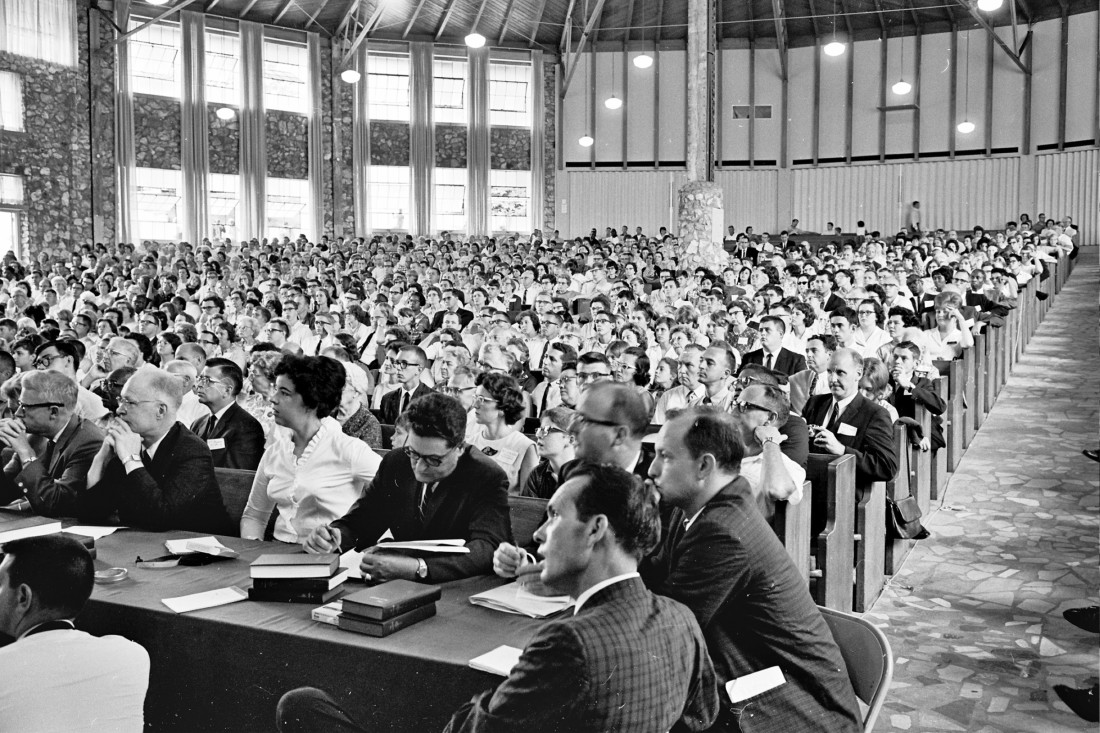We return this week with the third installment of the Rev. Martin Luther King Jr.’s speech, “The Church on the Frontier of Racial Tension.” Last week’s post covered two of the three points King wished to raise with his Montreat audience: The first, that segregation is a sin; the second, that the church must examine and denounce the ideational root of racial prejudice.
This week we continue with King’s third point.
To view last week’s segment, click here.
On Aug. 21, 1965 King said:
Now let me go to a third point that I think is very, very relevant here. After we have worked in the area of clearing up basic ideas, reaffirming the sense of immorality of segregation, then we must move into the arena of social action. In short, the church must develop a strong action program. A program of social reform, in order to make its gospel real and in order to make the ethics of Jesus Christ relevant at this time.
I know the basic arguments. There are those who say the church shouldn’t be bothered with this mundane stuff. So often the church has been so absorbed in an other worldly concern that it has lost sight of the here and the now. A Gospel true to its nature will be concerned, yes, about the beyond, but also about the here. A gospel true to its nature will be concerned, yes, about heaven, but also about earth.
There will be other arguments when we think about moving into the arena of social action. There are those who say that only time can solve the problem. I know you heard this argument. It is a myth of time. The idea that [there] is something in the very miraculous flow of time that will inevitably solve the problem of racial injustice. And so the people who follow this argument say to the Negro and his allies in the white community, just be nice and patient and wait a hundred or two hundred years and the problem will work itself out.
Well, there is an answer to that myth. It is that time is neutral. It can be used either constructively or destructively. And I say to you, my friends, this afternoon, that I’m convinced in so many instances that the people of ill-will in our nation have used time much more effectively than the people of goodwill. It may well be that we will have to repent in this generation, not merely for the vitriolic words and the violent actions of the bad people who will bomb a church in Birmingham, Alabama, or who will shoot down an Episcopal theological student in Lawrence County, Alabama, but also for the appalling silence and indifference of the good people who sit around and say wait on time.
Somewhere along the way we must come to see that human progress never rolls in on the wheels of inevitability. It comes through the tireless efforts and the persistent work of dedicated individuals who are willing to be coworkers with God, and without this hard work, time itself becomes an airlock of the primitive forces of social stagnation. So we must help time. We must always realize that the time is always right to do rightly.
And there is another myth that stands in the way of concrete social action. It is the idea that legislation cannot solve the problem of racial injustice, and only religion and education can solve the problems. Now at least there is a half-truth involved here. I would be the first to say: If we are going to solve the problems that we face in the areas of racial injustice, somehow attitudes must be changed. If we are going to solve the problems of racial injustice, all men must rise to the high mountain of love. If we are going to solve the problem of racial injustice, I’m convinced that every white person in our country must treat the Negro right, not merely because the law says it, but because it is natural and because it is right and because the Negro is his brother. So I would agree with anyone that says that legislation is not the ultimate answer. The ultimate answer is when men are obedient, not merely to that which can be enforced by the law, [but] when they will rise to the majestic heights of being obedient to the unenforceable.
But after saying this, we must look at the other side. It may be true that you cannot legislate integration, but you can legislate desegregation. It may be true that morality cannot be legislated, but behavior can be regulated. It may be true that the law cannot change the heart, but it can restrain the heartless. It may be true that the law cannot make a man love me, but it can restrain him from lynching me, and I think that’s pretty important also. Or that while the law cannot change the hearts of men, it does change the habits of men. And when you begin to change the habits of men, pretty soon the hearts will be changed and the attitudes will be changed, and so the church must see the necessity of supporting strong, meaningful civil rights legislation, whether it’s [the] Voting Rights Bill of 1965 or [the] Civil Rights Bill of 1964, or all the various sections and all of its titles. These are challenges that we face as we move out into the arena of social action.
Next week, we will continue with what King considers “the most serious problems that we face in our country.”



This is all relevant to our times.
Particularly the last paragraph.
Another great history lesson! Thank you,Thomas.
Thank you Thomas. So good to read these words in the Xpress.